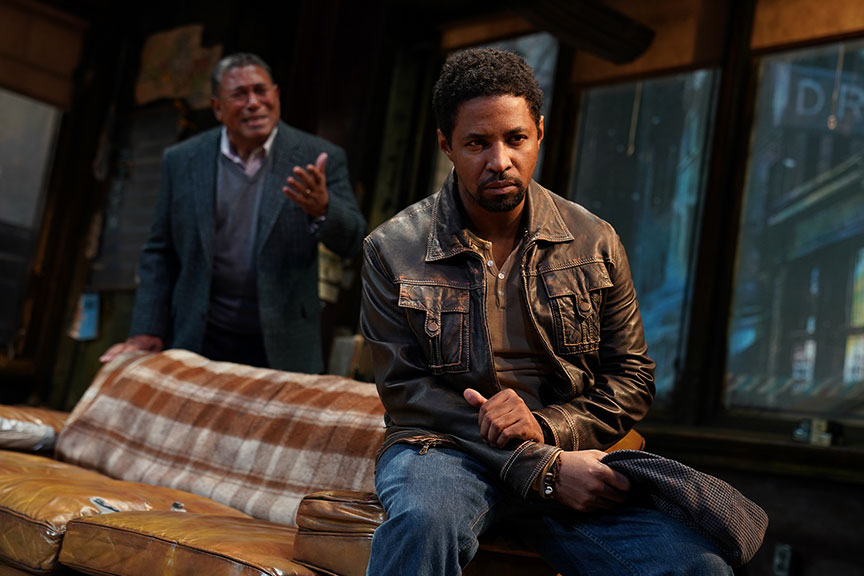|
Steven Anthony Jones and Amari Cheatom (foreground) in "Jitney." Photo by Joan Marcus The daunting struggles for survival and personal dignity reside in Jim Becker's gypsy cab station. The year is 1977, the place Pittsburgh's embattled Hill District. The play is "Jitney," the first work written in the late August Wilson's "Pittsburgh Cycle" though the latest chronologically of the 10. As staged at the Old Globe Theatre and directed by Ruben Santiago-Hudson, it's a penetrating, hang-on-every-word drama that touches sparks with every interpersonal conflagration.
The bracing intensity of the play is heightened by the richness of its principal characters: old Becker himself (Steven Anthony Jones), whose rules are posted on a wall in the ramshackle garage and whose iron fist is softened by a practically paternal sensitivity to those in his employ, however flawed; Turnbo (Ray Anthony Thomas), an old gossip with a hot head and a weary but resignedly workmanlike way of doing his job -- taxiing fares that the name cab companies won't accommodate; Youngblood (Amari Cheatom), whose very name defines his youth, impetuosity and sometimes reckless bravado; Fielding (Anthony Chisholm), whose alcoholism makes driving for Becker at best a day-to-day proposition. He's an old soul more comfortable reminiscing about his days as a suit-maker for Billy Eckstine and Count Basie; and Booster (Francois Battiste), Becker's 39-year-old son, who is released from prison after serving 20 years for killing his girlfriend and who shows up at his father's door -- the father whose heart he shattered and who never visited him in the pen. "Jitney" hinges on two ominous and complex conflicts: the bitter and unexpected reuniting of Becker and his son, and the prospect that the garage, out of which Becker's car service operates, will be shuttered to make way for a vaguely promised redevelopment project. But the rumblings of this play are woven in, out of, and in between the crisis points and realized in a series of conversations, revelations and showdowns (including one with a heavily breathing Turnbo aiming a gun at stiffly defiant Youngblood). The beauty of "Jitney" is that neither its storytelling nor its characters is without tenderness. For all their flareups and foibles, the men of Becker's car service care about each other and definitely return the affection their boss holds for them. Youngblood, too, is in his swaggering way trying to make a life for the mother of his child (Nija Okoro) and their two-year-old son. There is no tenderness between Becker and Booster. Just the searing flame of anger and the pain of disappointment and loss. Their faceoffs in the garage are fierce with tension. Anything could happen. Santiago-Hudson directs with a palpable appreciation for Wilson's words and affords his cast room to explore their characterizations, as if moment by moment. The Globe production incorporates atmospheric original music by Bill Sims Jr. in transitioning between scenes, with the riffing notes a striking parallel to the riffing being voiced onstage and creating a jazzy tableau beneath Jane Cox's lighting. The set by David Gallo is meticulous and funkily shopworn, with even the suggestion of one of the old jitney automobiles behind musty window glass. August Wilson's legacy at the Old Globe is a well-established one. "The Piano Lesson," "Two Trains Running" and "Joe Turner's Come and Gone" each premiered at the Balboa Park theater. "Jitney," first produced in Pittsburgh, did not begin at the Globe. But its arrival four decades later only burnishes that legacy. "Jitney" runs through Feb. 16 at the Old Globe Theatre in Balboa Park.
0 Comments
Leave a Reply. |
AuthorDavid L. Coddon is a Southern California theater critic. Archives
July 2024
Categories |
David Coddon |
|
